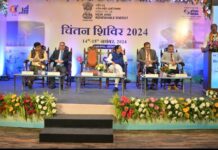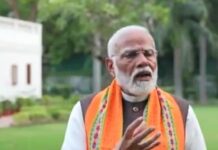
By Our Correspondent
BHUBANESWAR: The decision to appoint Senior Advocate and Advocate General of Odisha, Ashok Kumar Parija as the Chancellor of KIIT Deemed to be University, has invited severe criticism from legal as well as civil society fraternity. Parija, took charge on September 29 after Prof. Ved Prakash completed his term.
As per article 165 of the Constitution, AG shall discharge his duty as per advice of Governor and as well as Government, it is not known whether Parija sought approval or not before his appointment as Chancellor.
Some says Chancellor is an honorary position, so it will not hamper Parija’s work as Advocate General while others argued, if Odisha Government files any case against KIIT University, then what will be the role in AG, as he is sitting Chancellor of the said University
Parija’s appointment has created mixed response in different circle on the question of conflict of interest. Many of Civil Society Groups have also asked what will be role of Parija, if State Government. files any case against KIIT in the court of law. It is a debatable topic.
RTI activists’ Pradip Pradhan shared a 2021 social media post of , Advocate of Odisha High Court , Chitta Ranjan Behera, who had exposed about nexus of Ashok Parija , Achyuta Samant of KIIT and Justice Biswanath Rath, Odisha High Court centring around Stay order granted by Justice Rath on the order of Odisha Information Commission declaring KIIT as Public Authority under section 2 (h)(d)(ii) of the RTI Act.
The entire matter is that as per the social media post of Advocate Chitta Ranjan Behera, Ashok Kumar Parija, the incumbent AG of Odisha appeared as the counsel for the petitioner KIIT , a private body and could secure a stay order from the Orissa High Court on the operation of a 92-page, exhaustively-reasoned-out decision of a statutory authority called Odisha Information Commission, has in fact stupefied many an informed quarters including the legal fraternity at large in Odisha and beyond.
In the WP (C ) No.25922/2021, the stay order as sought for by the petitioner KIIT was granted by a single-member Bench of Justice Sri Biswanath Rath on 27.08.2021, only after hearing Sri Parija, who, strangely enough, appeared not in his official capacity as AG of Odisha, but as a Senior Advocate of the Odisha Bar.
Be that as it might, from the cut-and-dried stay order so passed, it is not possible to ascertain either the grounds availed by Sri Parija or the rationale that worked behind the Judge’s Order itself.
Granted that a Judge of the High Court enjoys the discretion of issuing an interim stay order, the points at issue which perturb the legal literati and political pundits across the state and beyond are quintessentially the twin as follows: (1) Whether a person such as Sri Ashok Parija sworn-in as the Advocate General under Article 165 of the Constitution to serve as the chief legal officer for the state is a Janus-faced entity, exceptionally privileged with a personal discretion to act at one moment in his official capacity as the AG for the State and at the next moment as mere Ashok Parija in the private capacity of a Senior Advocate?
Precisely speaking, does the Constitution allow a split persona in respect of the AG of a State? And, (2) Given the fact that Sri Ashok Parija, who acts and stays as the AG for a State and that too during the pleasure of Governor the head of the state, can he favour a non-state private body such as KIIT which is engaged in running mega business concerns around both general and technical education, and go against the reasoned-out Order of a statutory authority called Odisha Information Commission, which is a state entity within the meaning of Article 12 of the Constitution? Precisely speaking, the question is, whether the AG of a State, who is solely meant to act ‘for the State’ (vide the title of Article 165), can act against a state entity and that too, only to favour a private entity?
Before the cardinal issues at hand as framed above are taken up for an in-depth critique in the light of constitutional and statutory provisions that are in place, it is worth taking a quick glance at the rival Parties mentioned in the cause list of the High Court’s Interim Order dated 27.08.2021. The Petitioner was the KIIT, Bhubaneswar, which, as learnt from the KIIT’s website itself it, was founded by one Prof Achyut Samanta in 1992 with a humble investment of Rupees five thousand only. It was then a small NGO running a vocational centre with 12 students and 2 staffs only, but has grown up by now to be a massive Deemed-to-be University comprising 28 schools under 100 academic programmes for a total of 30,000 students along with a 2500-strong faculty, accommodated in 23 world-class campuses including 16 sports complexes having swimming pools and 15 food courts- all thriving in a sprawling area of 25 sq. km called KIIT township in the heart of the capital city of Bhubaneswar. Besides, as many as 60 countries of the world are also represented in its student population.
As per the admission of the KIIT, they could reach to such an outstanding position due to the generous contribution of land, grants and other resources from both Government and non-Government sources including several foreign countries. As a matter of fact, such piecemeal information extracted from the KIIT’s colourful website are only a miniscule of the massive inventory of world-class excellence, eminence and expertise that the KIIT supposedly commands as per the said website.
Above all, as learnt from the impugned order of OIC dated 05.08.2021, KIIT has also appointed Public Information Officer and First Appellate Authority as required on the part of a Public Authority under RTI Act 2005, but has all along refused to disclose any information to any information seeker under the said Act. That is the ruse and riddle around which the controversy around KIIT has been raging all through and still refuses to subside despite the recent Stay Order from the Orissa High Court that Sri Ashok Parija a Senior Advocate could avail to the benefit of his illustrious client albeit at a great risk to his official incumbency as the AG of Odisha.
As to the opposite parties as described in the cause list of the said HC order, they were Odisha Information Commission and another. As is well known, the OIC is a statutory authority established under Section 15 of RTI Act 2005 enacted by the Parliament with a view to bringing transparency and accountability in the functioning of the State and its organs, legislative, executive and judiciary and thereby building up an informed citizenry that can contain corruption and mal-governance plaguing the whole system.
The ‘Another’ Opposite Party, though not named in the HC Order was none else than a common citizen like you and me, namely Sri Pradip Pradhan, whose 2nd appeal made before the Information Commission supplemented by his numerous submissions made during the years of adjudication, had ultimately persuaded the then Chief Commissioner Sri Sunil Kumar Mishra to declare the KIIT a deemed Public Authority within the meaning of Section 2(h)(ii) of RTI Act and accordingly liable to make disclosure of information relating to itself and its multifarious activities to the information seekers as required on the part of a deemed public authority under RTI Act 2005.
Strangely enough, this very Order of the Chief OIC vide SA No. 228/2015 dated 05.08.2021, apparently a just and reasonable one, did however prove a millstone around the KIIT’s neck, under the unbearable pressure of which the latter in no time rushed to the Orissa High Court and AG of Odisha Sri Ashok Parija to rescue him from the risky label of a ‘public authority’ which the Commission’s decision sought to endow on it.
One feels utterly bemused as to why did KIIT’s founder Sri Samanta, to start with and subsequently the AG of Odisha Sri Parija took the OIC’s decision as an incorrigible affront to their self-cultivated wisdom, when the RTI query raised by Pradip Pradhan way back on 01.09.2014- so to say, the prime mover of the whole episode culminating in HC’s Stay Order dated 27.08.2021 – was so simple and innocuous one, i.e. “information regarding appointment of Ex-State and Central Government employees in KIIT University and its allied institutions”. It seems to be all the more quixotic on their part to keep on stubbornly refusing to share such a stupid piece of information with public, when the KIIT’s website itself is abuzz and agog in respect of a massive 2500-strong faculty of scholars and researchers par excellence.





























